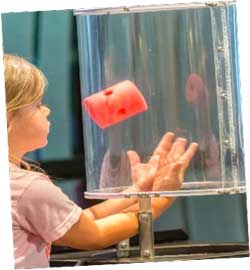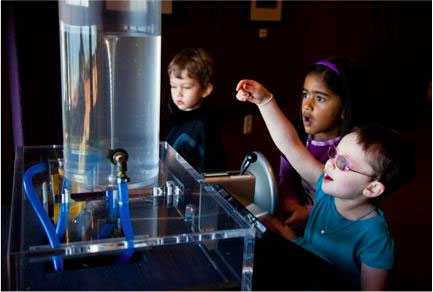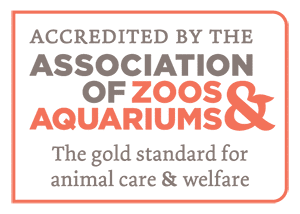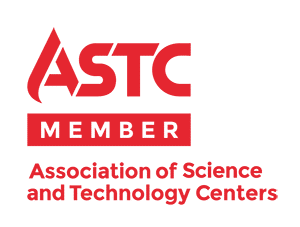PUBLICATIONS
Learning Through Play
THEY THINK. THEY'RE PLAYING.
At CuriOdyssey, kids learn through play.
Annie tosses a foam block into the Wind Tube exhibit, one of CuriOdyssey's 55 unique interactive indoor and outdoor exhibits. She's having too much fun to realize she is learning about complex scientific principles of loft, air pressure and air flow. And her parents might wonder, "Is Annie learning, or just playing?"
They can rest assured that Annie IS learning. Researchers can link children's cognitive development to their experiences at CuriOdyssey. Learning takes place best when young children are engaged and enjoying themselves. Here, children explore with their senses of touch, sight and sound. They are self-directed, engaged and focused – all essential to developing critical thinking skills, a hallmark of learning.
There are two kinds of play: free play involves objects, fantasy, make believe and movement. Guided play stimulates children's natural curiosity and desire to explore through learning materials presented by educators. Both kinds of play are child-directed, a central tenet of CuriOdyssey’s philosophy. Here, we let kids loose to observe animals and experiment with scientific phenomena. We allow the natural world to answer their questions at their own pace and on their own terms. At CuriOdyssey, we invite kids to think like scientists, encouraging them to ask questions, to seek real evidence, and to build understanding for themselves, all in a playful and creative environment.
Research has also shown that seeing how things relate to one another is an important step in cognitive development. According to Philip Zelazo, Ph.D., a developmental psychologist and neuroscientist, making these connections is critical to developing executive functioning skills, a vital component for a child's mental development. At CuriOdyssey, children see relationships and make connections during interaction with exhibits and during outreach lessons at schools. Parents report that their children drew conclusions and saw associations with ideas they knew originated through CuriOdyssey experiences. Some of the feedback we’ve heard: "I've noticed our daughter informing me of more facts about animals she's interested in. She has diversified her interest in many animals which we are pleased to see," and "He will refer back to things he learned or experienced. He drew on his animal knowledge from Junior Zookeepers for a long time last year.”
Kathy Hirsh-Pasek and Roberta Golinkoff, professors of psychology and education at Temple University and the University of Delaware respectively, suggest that our education system must move from the traditional definition of success as good test scores to one that prepares children to become competitive business leaders, entrepreneurs and scientific pioneers. Success is judged by outcomes that nurture happy, healthy, thinking, caring, and social children who are collaborative, creative and competent.
When watching children in the galleries, it is easy to see how these ideas are supported. "Children at CuriOdyssey are actively using their senses of touch, sight, sound and sometimes smell as they interact with the exhibits in the galleries and in the wildlife center," says Elsa Bailey, Ph.D. in her recent research study. We have a unique venue for collaborative investigation, activities associated with learning to focus and pay attention. In the galleries, you will find high (and excited!) levels of communication among children, caregivers and staff, important to all aspects of learning. Other forms of critical thinking such as problem solving, reflection and experimentation are also associated with learning and witnessed frequently as kids interact with exhibits. And importantly, parents report that CuriOdyssey experiences have encouraged children's confidence to tackle challenging things.
Researchers say that tapping into children's passions and enthusiasm and building on those interests promotes learning on the deepest level. All of CuriOdyssey's educational experiences spark passion in young minds – passions for learning and discovery. But for kids, having fun is what's most important. Fun that informs, inspires, and educates through play is fundamental at CuriOdyssey.
“...children at play are like pint-sized scientists testing theories. They imagine ways the world could work and predict the pattern of data that would follow if their theories were true...”
— Alison Gopnik, professor of psychology and affiliate professor of philosophy, University of California, Berkeley

“The CuriOdyssey environment and exhibits offer multiple opportunities to focus attention, refocus after distraction, and allow for repetition and refining actions.”
— Elsa Bailey, Ph.D.

Join the CuriOdyssey Community
LOCATION
1651 Coyote Point Drive
San Mateo, CA 94401
Ohlone Land Acknowledgement
650-342-7755
info@curiodyssey.org
CuriOdyssey is a 501(c)(3) non-profit, Tax ID 94-1262434

